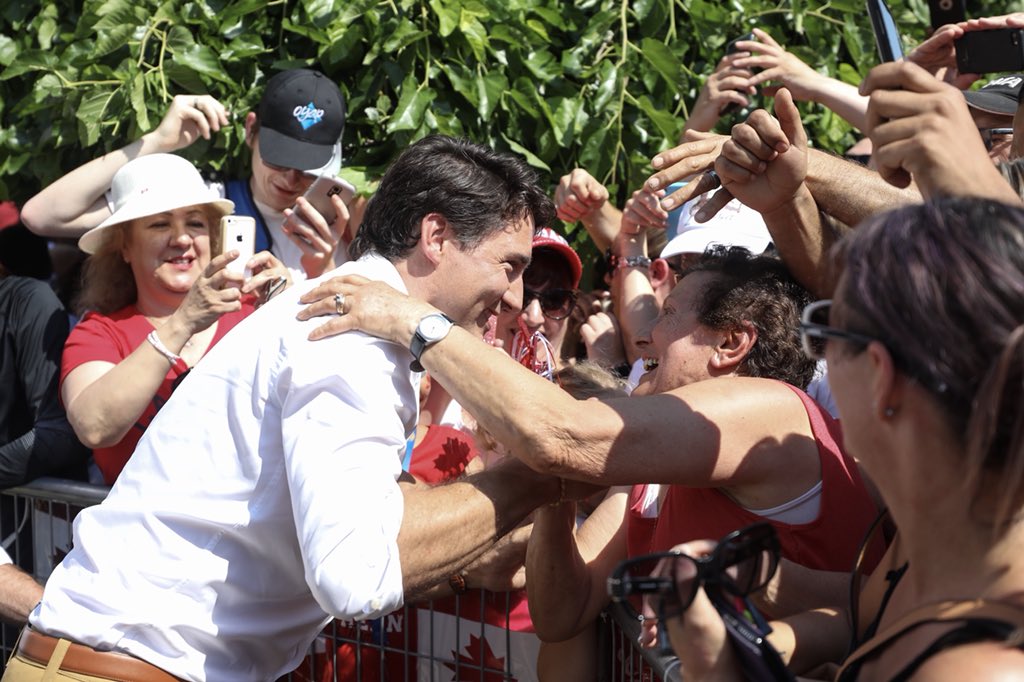
For someone who can sometimes elevate virtue-signalling above substance, Canada’s Prime Minister Justin Trudeau betrays rare consistency in managing to offend a wide range of countries. Fittingly, the latest episode comes courtesy of Twitter, the virtue signallers’ platform of choice.
The diplomatic row between Ottawa and Riyadh was provoked by tweets from Canada’s foreign ministry expressing concerns over arrests of women’s rights activists in Saudi Arabia. Riyadh called this an attack on Saudi sovereignty and imposed a string of diplomatic and economic sanctions, including divestment of Canadian equities, expulsion of the Canadian ambassador, recall of Saudi students, and cancellation of flights. Doubling down, Canadian foreign minister Chrystia Freeland responded, ‘Canada will always stand up for human rights in Canada and around the world—and women’s rights are human rights.’
Crown Prince Mohammed bin Salman’s over-the-top reaction may indicate a desire to consolidate his grip on power. He may also be signalling the West to back off from criticisms of Saudi Arabia’s human rights practices. Regardless, his tough stance was backed by regional allies, and Western countries studiously avoided voicing public support for Canada.
An inconsistent foreign policy is normal for all countries because states pursue many goals simultaneously and must balance opposing interests, clashes of interests with values, and competing values. Canada’s Saudi policy betrays exceptional incoherence because of the pursuit of mutually contradictory goals.
Values-based criticisms of human rights practices rub up against interests-based arms sales. On 28 August, a UN panel accused Saudi Arabia and the UAE-led military coalition of war crimes in Yemen. An independent investigation found Canada had approved C$284 million ‘in exports of Canadian weapons and military goods to countries bombing Yemen’ since 2015. Ottawa gave C$65 million in humanitarian aid to Yemen as a salve to Canada’s social conscience.
Last November, Trudeau infuriated the other 10 leaders when he failed to show up for the signing ceremony of the Trans-Pacific Partnership minus the US, with last-minute demands that included new environmental and cultural safeguards. In April, China rejected the ‘progressive’ elements of Ottawa’s trade agenda, such as entrenching labour standards, as a non-starter, scuttling free-trade talks.
Trudeau’s week-long visit to India in February was a train wreck. He was ridiculed for the dazzling display of sartorial splendour more suited to lavish Bollywood wedding scenes than quotidian Indian lifestyle. Jaspal Atwal, convicted of attempting to kill a visiting Indian cabinet minister in 1986, posed with Trudeau’s wife in Mumbai and was invited to the official dinner for Trudeau at the Canadian High Commission in New Delhi.
With wounds from some Canada-based Sikh terrorist attacks on Indian targets in the 1980s easily reopened, this was a major diplomatic faux pas. Yet, remarkably, it had been foreshadowed two years earlier when, in response to a question from an American university student in Washington, Trudeau boasted he had more Sikhs in cabinet than India’s Narendra Modi. It was an ill-judged and politically high-risk quip. At the time, it could be explained away as an amateurish gaffe by an inexperienced government. Rookie mistakes by a government several years in office cannot be as easily brushed aside.
After the G7 summit in Montreal, US President Donald Trump fired off two acrimonious tweets hurling personal insults at Trudeau. In the first, he distanced the US from the G7 communiqué proudly unveiled to the press by Trudeau as the host leader, decrying ‘Justin’s false statements’. In the second, after watching Trudeau’s promise to retaliate against US tariffs on Canadian imports, Trump wrote, ‘PM Justin Trudeau of Canada acted so meek and mild during our @G7 meetings’. But in his press conference, Trudeau had shown himself to be ‘Very dishonest & weak’.
Of course, in dealings with Trump, Trudeau can tap into the frustrations shared by leaders around the world and play to populist sentiments at home. His team has been professional in trying to maintain civil discourse with Washington despite Trump’s hostile criticisms of Canada’s dairy trade practices. Yet even in this vital relationship Trudeau has occasionally lapsed into fairyland demands for clauses in the renegotiated trade deal that would address gender equality and indigenous rights.
As an old saying has it, the winner of the annual competition for the world’s most boring headline is: ‘Yet another worthy Canadian initiative’. Perhaps Canada produces more public virtue than can safely be consumed at home. The surfeit of foreign policy train wrecks suggests that the excess virtue can no longer be safely exported either.
A foreign service officer is the repository of the collective wisdom of the department. Under the previous government, led by Stephen Harper, Canada’s foreign service was gutted. Trudeau should repair the damage, rescuing the service from marginalisation. As maybe the smartest person in the room but lacking foreign policy street smarts, he should seek contrarian advice from seasoned officials.
Former Australian foreign minister Gareth Evans offers a three-step formula for effective middle power diplomacy: identify the core foreign policy objectives, assess national capabilities to advance them, and choose the priorities against domestic and international constraints. On human rights promotion, his golden rule is do that which is productive, minimise the underproductive, and avoid anything counterproductive. Canada’s Twitter diplomacy violates the third recommendation. It has all but ensured a prolonged detention of the Saudi women’s rights activists and antagonised a key regional power.
A meddlesome foreign policy is rarely successful for middling countries. Canada should stop deluding itself that other countries are yearning for Ottawa to light the virtuous path for them. They have their own values, agendas and policy priorities. Being the universal global boy scout of international relations may gratify the twitterati at home but can damage relations that matter abroad. Better to prioritise doing good over feeling good.

